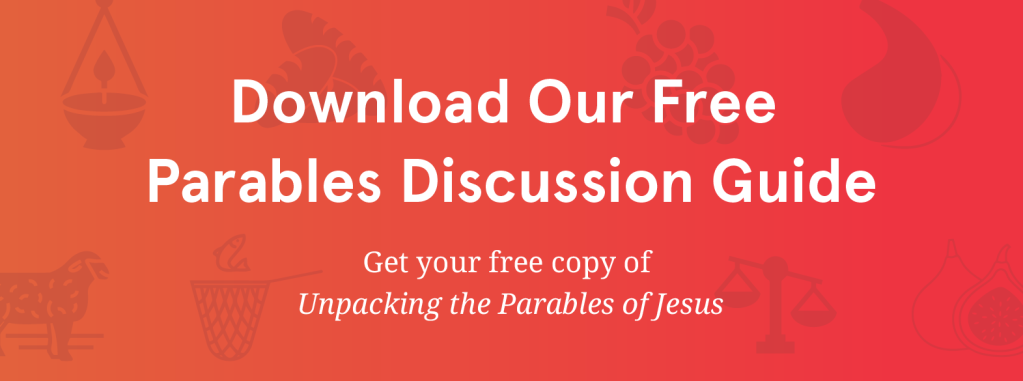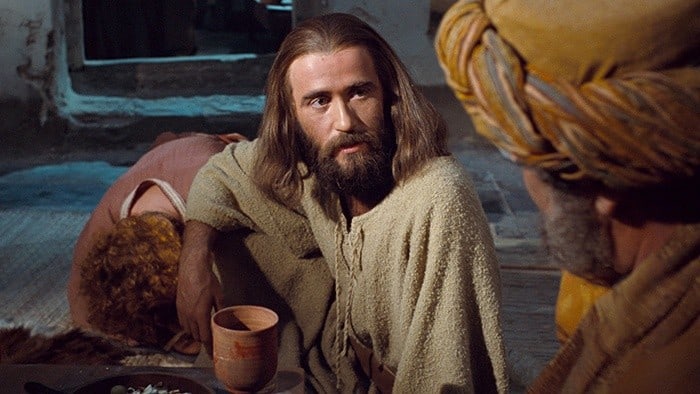Jesus had a powerful and evocative way of communicating truth. By framing truth in stories, He brought concepts to life. If He wanted listeners to easily understand what He was saying, a story did the trick.
One time He used a parable to drive a point home. He was in the house of a Pharisee named Simon. It started when Jesus was invited to Simon’s home for a meal. These sorts of meals provided opportunities for the host to demonstrate their social standing. Jesus was becoming quite the local celebrity, and having a kind of open house where people could come and eat with Jesus and ask Him questions made the host seem important.
This is why when a local woman with a reputation for sin heard Jesus was going to be there, she decided to make an appearance. If you think about it, her decision is pretty amazing. She knows that she’s not going to be welcomed there. Her desire to be in Jesus’s presence put her in an extremely vulnerable social position.
As Jesus reclined at the table, she stood behind Him weeping. As Jesus will point out later, His feet are still dirty and Simon hasn’t provided customary foot washing. This woman begins washing His feet with her tears and wiping them with her hair. Then she begins anointing His feet with the expensive perfume she has brought-probably the only thing she owns of any value.
Luke tells us, “When the Pharisee who had invited him saw this, he said to himself, ‘If this man were a prophet, he would know who is touching him and what kind of woman she is-that she is a sinner’” (Luke 7:39).
This woman’s reputation precedes her. As far as Simon is concerned, Jesus can’t be a prophet because He’s letting this woman touch Him. He assumes that if Jesus were a prophet, He’d know what kind of woman she was and want nothing to do with her. In Simon’s economy, righteous people avoided sinners like the plague. He can’t imagine that Jesus would know her history and still value her attention.
The Parable of the Moneylender
Jesus responds to Simon’s grumbling with a parable:
“Two people owed money to a certain moneylender. One owed him five hundred denarii, and the other fifty. Neither of them had the money to pay him back, so he forgave the debts of both. Now which of them will love him more?”
Simon replied, “I suppose the one who had the bigger debt forgiven.”
“You have judged correctly,” Jesus said (Luke 7:41-43).
The meaning of this parable isn’t hard to figure out, and Simon gets it immediately. A denarius was about the daily wage for a laborer. One debtor owed almost two years’ salary, while the other person owed fewer than two months’ wages. Both would be thankful to have their debts forgiven, but their appreciation wouldn’t be the same. The one who owed the most would be the most grateful.
Jesus sees a person, not a problem
Then he turned toward the woman and said to Simon, “Do you see this woman? I came into your house. You did not give me any water for my feet, but she wet my feet with her tears and wiped them with her hair. You did not give me a kiss, but this woman, from the time I entered, has not stopped kissing my feet. You did not put oil on my head, but she has poured perfume on my feet. Therefore, I tell you, her many sins have been forgiven-as her great love has shown. But whoever has been forgiven little loves little” (Luke 7:44-47).
Luke makes a critical point in his narrative. Jesus turns His attention to the sinful woman and then makes sure that Simon sees her, too. When Jesus asks the Pharisee if he sees this woman, He’s asking an important question. Of course, Simon sees her-but not as a person. He sees a sinner. A problem. A social issue.
After drawing his attention to this woman, Jesus begins to humanize her. A good host would have at least provided water for guests to wash their feet, but Simon didn’t bother. A good host would have greeted their guest with a kiss (the first-century Judean version of a handshake), but Simon didn’t. A good host would have anointed their guest’s head with oil. Again, Simon neglected this opportunity.
Meanwhile, this woman busted into this party and demonstrated a level of love and appreciation for Jesus that Simon lacked. Why? Because-like the person who was forgiven a great debt-she was aware of this vast gulf that existed between her and the Lord. Simon, on the other hand, wasn’t hungry for Jesus’s approval. He got what he needed by following the law and being a good Jew.

Leading a small group or Bible study?
Download a free copy of Unpacking the Parables of Jesus. This guide is packed with the necessary tools to lead your group through an insightful discussion of Jesus’ parables. You’ll find critical insights and thoughtful questions to help guide your group through Jesus’ essential teachings. You’ll also receive our bi-weekly JFP News, packed with films and resources to help you share Jesus’ story with the world.
The trouble with self-sufficiency
When push comes to shove, the Parable of the Moneylender is about self-reliance. The person who is forgiven the most significant debt loves the lender more because they were less capable of dealing with the amount they owe. Jesus used this parable to express the same issue with Simon and this woman.
The desperation this woman felt to communicate her love of Jesus was great because she understood her place in society. She was a castoff-first-century persona non grata. There was no way for her to come to Jesus on her own merits. If she was going to forge a connection, Jesus would have to fill that gap.
Simon’s experience was different. He didn’t have to work to earn the respect of his peers. He wasn’t worried about his standing before God. But the security he felt was built upon a misunderstanding of his true condition. He didn’t feel he had much to be forgiven for, so he didn’t feel a great deal of thankfulness. His lack of need translated itself into a lack of love.
Recognizing our need
When we read this parable, we need to ask if we love Jesus in a way that acknowledges what He’s done for us. The more we recognize the depth of God’s forgiveness toward us, the more we’ll go out of our way to worship, sacrifice, and obey.
When we understand the grace that He extends toward us, devotion will be our natural response.
(All Scripture references quote the New International Version unless otherwise noted.)
